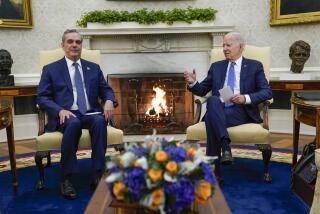OAS Urged to Adopt Free-Market Policies : Shultz Lectures Latins on Debt
CARTAGENA, Colombia — Secretary of State George P. Shultz told Latin American nations Monday that they must adopt free-market economic policies and seek more direct investment from multinational corporations if they want to overcome their foreign debt problems.
“If dynamic growth is to be restored, major economic restructuring has to take place,” Shultz told the General Assembly of the Organization of American States in its opening session.
He said that the United States, in return, would be willing to support large new loans to developing nations to help them overcome their short-term debt problems, a plan first proposed by U.S. Treasury Secretary James A. Baker III in October.
But Colombian President Belisario Betancur took issue with the U.S. approach, calling the Reagan Administration proposals “positive but insufficient.”
Betancur, speaking before delegations from 31 countries in the convention center here, said the “time bomb” represented by Latin America’s $380-billion foreign debt could only be defused by a “new Marshall Plan” for economic development.
He said the Baker proposals should be accompanied by policy measures in the industrial countries leading to a reduction in interest rates, improvement in basic commodity prices, an increased flow of foreign capital “useful to the region,” opening of industrial markets to Latin exports and strengthening of international commodity agreements.
Foreign Minister Enrique Iglesias of Uruguay, chairman of the Cartagena Group on Latin American debt, elaborated on this so-called political approach to the foreign debt during a two-hour closed meeting that Shultz held with Latin American foreign ministers.
Iglesias said a 2% reduction in interest rates on the debt would save Latin American countries $10 billion next year, and a return to the 1980 level of commodity prices would increase export earnings by $20 billion. The total, Iglesias said, would cover all but $5 billion of the debt service that Latin America must pay next year.
Shultz also met with the foreign ministers of Mexico, Colombia, Venezuela and Panama, who have been working for nearly three years on a peace treaty for Central America. He told them that the United States has not wavered in its refusal to open direct negotiations with the Marxist government of Nicaragua.
Nicaragua has demanded such talks, and several of the mediating countries, known as the Contadora Group, have privately asked the United States to accede.
But Shultz, speaking to reporters after his meeting, said: “No progress was made on that, in the sense that there was nothing suggested about Nicaraguan willingness to engage in the kind of internal reconciliation that we have felt was a central attribute of any dialogue we might have with them.”
He was referring to the Administration’s demand that Nicaragua open talks with the U.S.-funded rebels known as contras, who are fighting to overthrow the leftist regime in Managua.
During the foreign ministers meeting, Shultz traded accusations with Alejandro Bendana, secretary general of the Nicaraguan Foreign Ministry.
Bendana accused the United States of threatening the peace process in Central America by announcing new military maneuvers with Honduras.
Later, at a press conference, Shultz charged that Nicaragua had supported the Colombian guerrilla group M-19, which mounted an attack on the Colombian Supreme Court last month. Ninety people, including 12 judges, were killed when the Colombian army stormed the building in Bogota.
Bendana denied that the Sandinistas had had any role and noted that Colombia had never made such a charge against Nicaragua.
Massive security surrounded Shultz during his one-day visit to this old Spanish colonial port city--a response, U.S. officials said, to recent violence by leftist Colombian guerrillas.
They said that there had been no specific threat against the secretary’s safety, “only a general fear,” as one security official put it.
Colombian soldiers in battle dress patrolled the streets, black-suited frogmen swam in a small yacht harbor next to the convention center and dozens of State Department security agents brandished submachine guns.
In his speech, which he characterized as unusually blunt, Shultz told the Latin Americans that they should emulate the fast-growing capitalist economies of East Asia, seek more direct foreign investment and sell off government-owned enterprises to private investors.
Not Ideology
Those would be major changes for countries like Brazil and Argentina, which have attempted in the past to spur development through state-directed investment. That, in turn, has restricted foreign ownership of businesses.
“It isn’t a matter of ideology,” Shultz told reporters before delivering the speech. “It’s a matter of what will work, of what will bring about more economic growth. . . . I think that the trends around the world are moving in this direction.”
Shultz said he was calling on the Latin American countries to reform their economies as part of “a global bargain” in which the United States and other wealthy nations would provide new financing.
But Shultz put his emphasis Monday not on what the industrialized nations were offering but on the concessions that the Third World countries will be asked to make if the so-called Baker Plan moves forward.
“The successful countries have encouraged private initiative, avoided excessive regulation and provided adequate incentives for productive investment,” Shultz said. “They have relied primarily on markets to set interest rates and prices and have maintained appropriate exchange rates. They have avoided excessive government consumption and control.
“Growth has . . . been hindered by hostility to foreign direct investment,” he said. “This has not only added to the dependence on debt financing; it has also shut out the potential benefits from the technology and marketing capabilities of multinational firms.”
Shultz said one symptom of the Latin economies’ structural flaws has been the massive flight of private capital from those countries, which he estimated at $100 billion--a figure he called “gigantic.” He called on the Latin American nations to develop policies to entice their own wealthy investors back. He proposed selling state-owned enterprises as one possible measure.
“Perhaps the privatization of public enterprises could offer an opportunity” to entice flight capital back, he said.
The Cartagena debt group, made up of 11 Latin American countries, has scheduled a meeting for Dec. 16-18 in Montevideo, Uruguay, to examine the debt situation, including a response to the Baker proposals.
More to Read
Sign up for Essential California
The most important California stories and recommendations in your inbox every morning.
You may occasionally receive promotional content from the Los Angeles Times.











